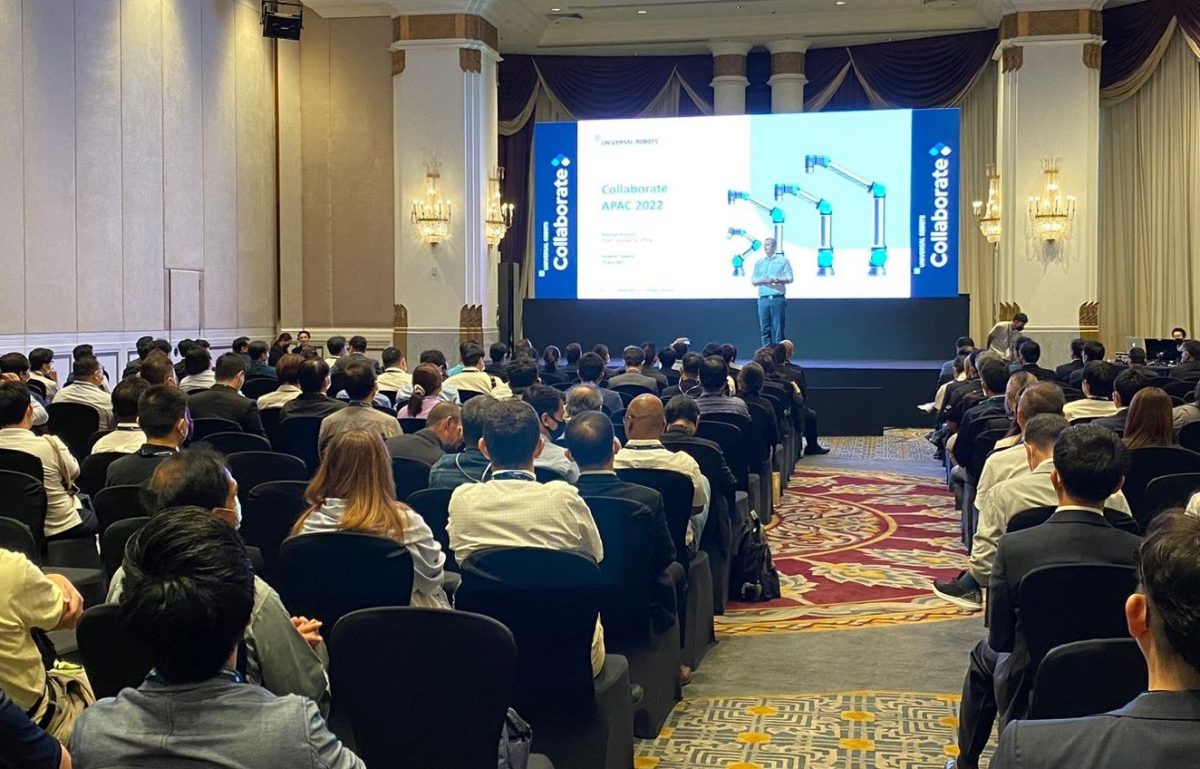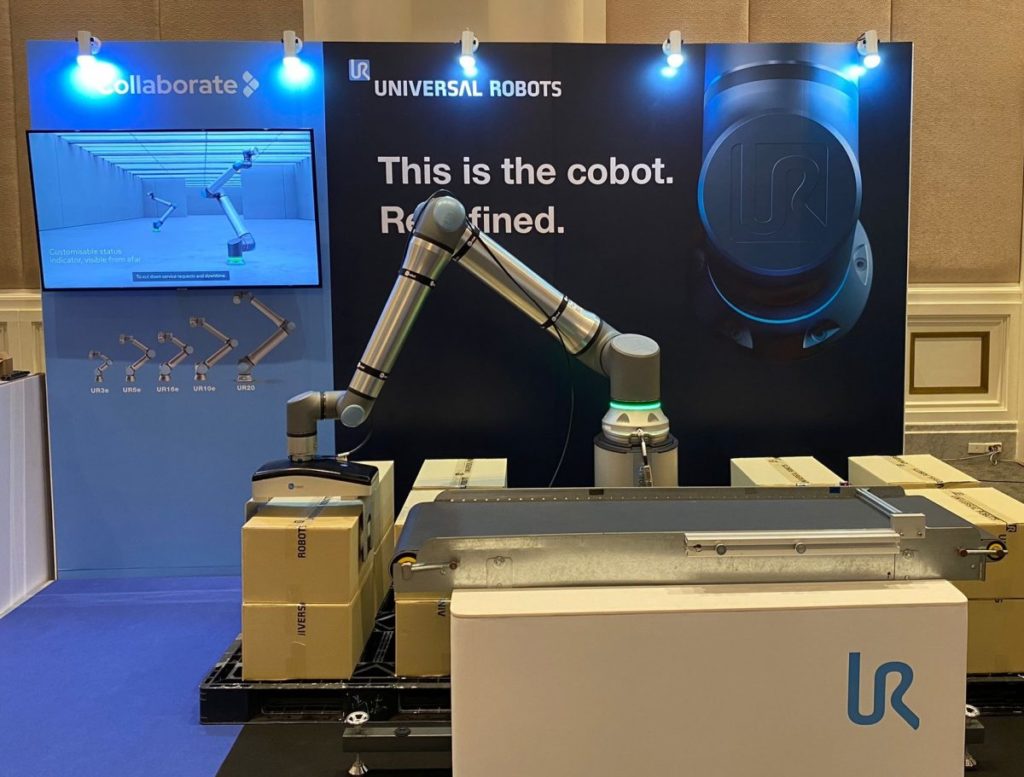Universal Robots (UR), the global leader in the rapidly growing market of collaborative robots (cobots), holds Collaborate APAC 2022, the largest cobot conference in Asia Pacific, today at The Athenee Hotel, a Luxury Collection Hotel in Bangkok, Thailand.
Building a collaborative ecosystem
In this fast-paced world, it is all about adding value, establishing trust and ultimately creating a connection. Companies that thrive are surrounded by a collaborative ecosystem of business partners. Universal Robots is one such company, creating an extensive ecosystem of independent businesses all united through innovation. UR ecosystem comprises mainly UR+, distributor network, certified system integrators and Original Equipment Manufacturers (OEM).
Universal Robots creates the world’s first ecosystem of approved UR+ partners, building a platform to work with third parties technology experts. These partners offer new and innovative components and application kits for each business’s unique needs. Now, the UR+ platform includes over 300 UR+ partners and over 400 certified UR+ components, application kits and solutions. The growing number of UR+ solutions, including cobots, hardware, software, installation services, manual and operational support and training, is a standard solution to manufacturers’ challenges. In addition, all UR+ products are certified as compatible and easily integrated with UR cobots.
Today, Universal Robots hosts the largest conference, Collaborate APAC 2022, gathering partners in the cobot ecosystem to present and demonstrate solutions for manufacturers. Several OEMs and UR+ partners including OnRobot, Mirka Asia Pacific Pte Ltd., SCHUNK Intec Pte Ltd, Baumer (Singapore) Pte Ltd, SICK Pte Ltd, Nordbo Robotics, Mech-Mind Robotics and Impaqt Robotics were invited to share their experiences in the keynote sessions. Opportunity and necessity continue to drive innovation and, with the UR ecosystem, there is no limit to the imaginative ways manufacturers can bring robots alongside humans into the world of work, and improve both working lives and performance.
Conference Highlights
Opening the conference with an inspiring speech, Mathias Wiklund, Chief Commercial Officer, Universal Robots, shares how Universal Robots continues to combine the strength of a global company with the spirit of a start-up.
“From its humble beginnings in Denmark, this current day we have deployed 50,000 cobots around the world, represented by 1000 employees, across 6 continents, over 200 ecosystem partners with applications looking to improve and benefit various industries across the world. This is UR,” says Wiklund. “We are honoured to be joined by our UR ecosystem partners who will give insights on how we can disrupt the common processes of operative work by working with UR collaborative robots. Human centricity is the main idea behind collaborative robots, therefore as a result enhancing the quality of life of workers with automation and robots. This is the future of work; agile, efficient, and productive.”
For the first time in Asia Pacific, Universal Robots debuts the UR20 cobot, the next generation of industrial cobots at Collaborate APAC 2022. Connecting over 200 attendees comprising cobot users, decision-makers, influencers and UR+ ecosystem partners, the conference presents an opportunity to showcase the all-new collaborative, industrial cobot from Universal Robots.
With 1,750 mm reach and 20kg payload, the new UR20 is designed to take performance to new heights, while embracing the UR cobot hallmarks of versatility, usability and small footprints. In line with this year’s “Redefining Automation” theme, Universal Robots highlights how UR20 is reimagined, redesigned and rebuilt from the ground up to deliver greater performance and quality.
Delivering the first keynote at Collaborate APAC 2022, Niels Haenisch, Partner, Boston Consulting Group, Lead, Innovation Centre for Operation, Singapore dives deeper into the evolution of automation the key building blocks for the future of automation.
“In previous industrial revolutions (steam engine, electrification, and computerisation), the exact same question was being discussed. And in truth, technological change always brings huge changes to workers. In preindustrial economies, farmers made up more than 80 percent of the population. In today’s developed economies, it is less than 5 percent. However, that does not mean that 75 percent are now unemployed. While some tasks were taken on by technology, many new jobs are created as well. The same holds true for this current Digital Industrial Revolution. In I4.0, there will be fewer lower-qualified manual jobs and more jobs requiring well-qualified backgrounds like data scientists and completely new job profiles such as robotics coordinators. In many cases, technology will not replace workers but relieve them to work on better roles, leading to “a Bionic Enterprise” in which humans and technology collaborate and complement each other’s capabilities for higher impact and productivity,” says Haenisch.
Senior leaders kick off a panel discussion
At Collaborate APAC 2022, senior leaders gather to discuss the feasibility of a four-day manufacturing week in Asia. Physical stress, mental exhaustion, and fulfilling customers’ deadlines are some of the common onsets of work fatigue due to the COVID-19 pandemic. Spruce of terminologies such as flexible working and work-life balance has become the talk of the town. According to a survey by Milieu, 75 percent of the employees in Thailand have expressed great interest in a compressed four-day work week. While many companies have taken steps to trail-blazar this notion and putting emphasis on a four-day work week, the manufacturing industry is less receptive to such arrangements. At the panel discussion, automation and robotic experts discuss how leveraging emerging technologies can facilitate a reduction in working hours and improve job satisfaction.
The session was facilitated by Dr Yeong Che Fai, Associate Professor, University of Technology Malaysia. Panellists include:
- Balaji Koneru, General Manager, Nala Robotics
- Dr Prapin Abhinorasaeth, President, Thai Automation and Robotics Association
- Lars Bach, Head of R&D, Cobot Arm, Universal Robots
“The feasibility of four-day manufacturing work week in Thailand would be a real challenge to achieve. To achieve this, the successful deployment of automation and robotic systems in the manufacturing floor, business process automation and AI such as smart Enterprise Resource Planning (ERP) in back office and IIoT and IoT data connectivity between the two are among the requirements needed. Besides, the existing and additional Thai government corporate tax incentives will help make it a reality,” says Dr Prapin Abhinorasaeth, President, Thai Automation and Robotics Association.
About Universal Robots
Universal Robots aims to empower change in the way work is done using its leading-edge robotics platform.
Since introducing the world’s first commercially viable collaborative robot (cobot) in 2008, UR has developed a product portfolio including the UR3e, UR5e, UR10e, UR16e and UR20, reflecting a range of reaches and payloads.
Each model is supported by a wide selection of end-effectors, software, accessories and application kits in the UR+ ecosystem. This allows the cobots to be used across a wide range of industries and means that they can be redeployed across diverse tasks.
The company, which is part of Teradyne Inc., is headquartered in Odense, Denmark, and has offices in the USA, Germany, France, Spain, Italy, the Czech Republic, Romania, Turkey, China, India, Japan, South Korea, Singapore and Mexico.
Universal Robots has installed over 50,000 cobots worldwide.
For more information, please visit www.universal-robots.com.
Source: Mind PR

